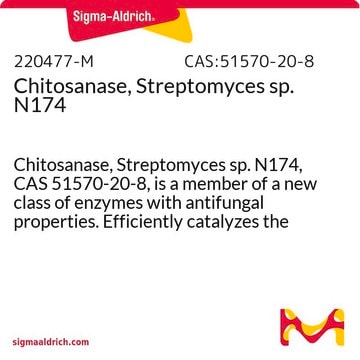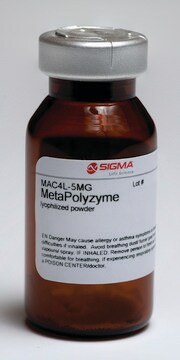C8241
Chitinase from Trichoderma viride
lyophilized powder, ≥600 units/g solid
Synonym(s):
N-acetyl-β-glucosaminidase and chitodextrinase
Sign Into View Organizational & Contract Pricing
All Photos(3)
About This Item
EC Number:
MDL number:
UNSPSC Code:
12352204
NACRES:
NA.54
Recommended Products
form
lyophilized powder
Quality Level
specific activity
≥600 units/g solid
mol wt
30 kDa
solubility
0.05 M phosphate buffer, pH 6.0: soluble 0.90-1.10 mg/mL, faintly hazy to hazy (with particles)
shipped in
wet ice
storage temp.
−20°C
General description
Chitinase is an extracellular complex of enzymes that degrade chitin. Chitin is a cell wall component of Fungi and exoskeketal essentials of different organisms which reshape their own chitin or digest/dissolve the chitin of other organisms (insects, fungi, yeast, and algae, and in the internal structures of other vertebrates) . Chitinases have been detected in many microorganisms and in plants. In fungi, chitinases assist in morphogenesis, to break down the inherent chitin content of fungal cell walls. Plant chitinases help in resistance to fungal attack and counteracting fungal growth, by targeting those same fungal cell walls. In bacteria, bacterial chitinases assist in utilizing chitin as a carbon source and as an energy source.Streptomyces griseus produces multiple chitinases of different molecular masses after growth induction with chitin as the carbon source.
The enzymatic hydrolysis of chitin to N-acetyl-D-glucosamine involves two consecutive enzyme reactions:
The enzymatic hydrolysis of chitin to N-acetyl-D-glucosamine involves two consecutive enzyme reactions:
- The first reaction, chitodextrinase-chitinase, is a poly(β-(1→4)-[2-acetamido-2-deoxy-D-glucoside])- glycanohydrolase, which removes chitobiose units from chitin.
- The second activity is N-acetyl-glucosaminidasechitobiase, which cleaves the disaccharide to its monomer subunits, N-acetyl-D-glucosamine.
Application
Agriculture fields: control pathogens.
Human health care: Asthma.
Pharma: preparation of chitooligosaccharides and N-acetyl D glucosamine,
Preparation of single-cell protein
Isolation of protoplasts from fungi and yeast
Control of pathogenic fungi
Treatment of chitinous waste, mosquito control and morphogenesis
Human health care: Asthma.
Pharma: preparation of chitooligosaccharides and N-acetyl D glucosamine,
Preparation of single-cell protein
Isolation of protoplasts from fungi and yeast
Control of pathogenic fungi
Treatment of chitinous waste, mosquito control and morphogenesis
Biochem/physiol Actions
Chitinase is a 30 kDa (approx.) extracellular enzyme complex that degrades chitin. Chitin is degraded to N-acetyl-D-glucosamine in 2 enzymatic reactions. Firstly, chitobiose units are removed from chitin by chitodextrinase-chitinase, a poly(1,4-β-[2-acetamido-2-deoxy-D-glucoside])-glycanohydrolase. The second reaction involves N-acetyl-glucosaminidase-chitobiase, which cleaves the disaccharide to its monomer subunits of N-acetyl-D-glucosamine. The enzyme may be classified into endo- and exochitinase. The endochitinase activity involves random cleavage at internal points in the chitin chain. The exochitinase activity consists of a progressive action which starts at the non-reducing end of chitin and releases chitobiose or N-acetyl-glucosamine units. The chitinolytic enzymes from T. viride are a mixture of extracellular chitinolytic enzymes, which exhibit exo- and endochitinase activities. The major activity was found to be that of N-acetyl-β-glucosaminidase.
Chitinase serves as a biopesticide against several fungi and insects. This hydrolytic enzyme is capable of cleaving the glycosidic bonds in chitin.
Features and Benefits
Chitinase is an extracellular complex of enzymes that degrade chitin. It is a lytic enzyme suitable for fungal cell walls lysis.
Unit Definition
One unit will liberate 1.0 mg of N-acetyl-D-glucosamine from chitin per hour at pH 6.0 at 25 °C in a 2 hour assay.
One new 1 hour unit = approx. 50 old 48 hour units.
One new 1 hour unit = approx. 50 old 48 hour units.
Other Notes
View more information on enzymes for complex carbohydrate analysis at www.sigma-aldrich.com/enzymeexplorer
Signal Word
Danger
Hazard Statements
Precautionary Statements
Hazard Classifications
Resp. Sens. 1
Storage Class Code
11 - Combustible Solids
WGK
WGK 3
Flash Point(F)
Not applicable
Flash Point(C)
Not applicable
Personal Protective Equipment
dust mask type N95 (US), Eyeshields, Gloves
Choose from one of the most recent versions:
Certificates of Analysis (COA)
Lot/Batch Number
Don't see the Right Version?
If you require a particular version, you can look up a specific certificate by the Lot or Batch number.
Already Own This Product?
Find documentation for the products that you have recently purchased in the Document Library.
Customers Also Viewed
Antifungal effect and chitinase activities of the froth of spittlebug Poophilus costalis (Walker)(Hemiptera: Cercopoidea: Aphrophoridae)
Chang SC, et al.
Journal of Asia-Pacific Entomology, 22(1), 269-273 (2019)
Chitinases
Enzymes in Human and Animal Nutrition, 361-378 (2018)
Marion Schiavone et al.
FEMS yeast research, 14(6), 933-947 (2014-07-22)
A reliable method to determine cell wall polysaccharides composition in yeast is presented, which combines acid and enzymatic hydrolysis. Sulphuric acid treatment is used to determine mannans, whereas specific hydrolytic enzymes are employed in a two sequential steps to quantify
Functional Microbial Diversity: Functional Genomics and Metagenomics Using MAPLE
Microbial Diversity in the Genomic Era, 427-449 (2019)
Sonia Żółtowska-Aksamitowska et al.
International journal of biological macromolecules, 112, 1021-1028 (2018-02-17)
Among marine demosponges (Porifera: Demospongiae), only representatives of the order Verongiida have been recognized to synthetize both biologically active substances as well as scaffolds-like fibrous skeletons made of structural aminopolysaccharide chitin. The unique 3D architecture of such scaffolds open perspectives
Our team of scientists has experience in all areas of research including Life Science, Material Science, Chemical Synthesis, Chromatography, Analytical and many others.
Contact Technical Service













